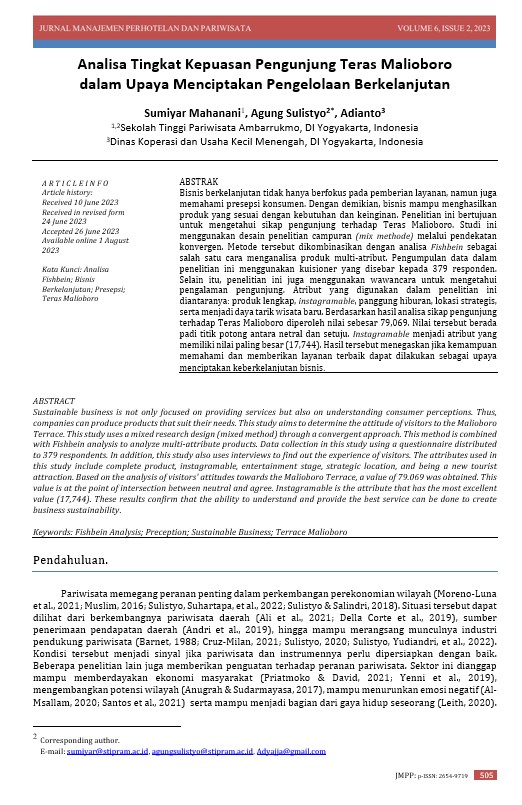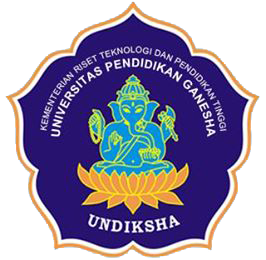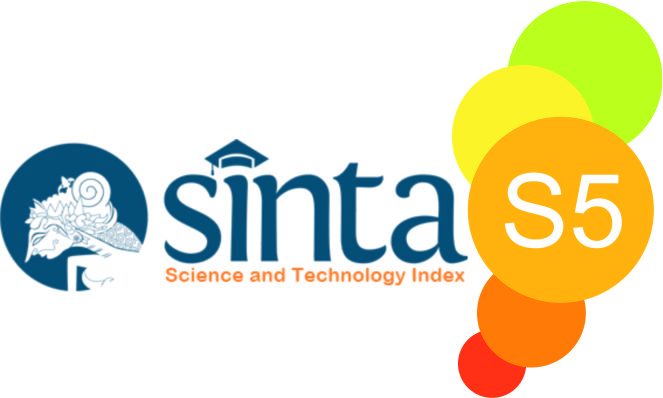Analisa Tingkat Kepuasan Pengunjung Teras Malioboro dalam Upaya Menciptakan Pengelolaan Berkelanjutan
DOI:
https://doi.org/10.23887/jmpp.v6i2.63202Keywords:
Analisa Fishbein, Bisnis Berkelanjutan, Presepsi, Teras MalioboroAbstract
Bisnis berkelanjutan tidak hanya berfokus pada pemberian layanan, namun juga memahami presepsi konsumen. Dengan demikian, bisnis mampu menghasilkan produk yang sesuai dengan kebutuhan. Penelitian ini bertujuan mengetahui sikap pengunjung terhadap Teras Malioboro. Studi ini menggunakan desain penelitian campuran (mix methode) melalui pendekatan konvergen. Metode tersebut dikombinasikan dengan analisa Fishbein sebagai salah satu cara menganalisa produk multi-atribut. Pengumpulan data dalam penelitian ini menggunakan kuisioner yang disebar kepada 379 responden. Selain itu, penelitian ini juga menggunakan wawancara untuk mengetahui pengalaman pengunjung. Atribut yang digunakan dalam penelitian ini diantaranya: produk lengkap, instagramable, panggung hiburan, lokasi strategis, serta menjadi daya tarik wisata baru. Berdasarkan hasil analisa sikap pengunjung terhadap Teras Malioboro diperoleh nilai sebesar 79,069. Nilai tersebut berada padi titik potong antara netral dan setuju. Instagramable menjadi atribut yang memiliki nilai paling besar (17,744). Hasil tersebut menegaskan jika kemampuan memahami dan memberikan layanan terbaik dapat dilakukan sebagai upaya menciptakan keberkelanjutan bisnis.
References
Ali, M., Sulistiono, Imran, Z., & Simanjuntak, C. P. H. (2021). The potential development of ecotourism based on mangrove ecosystem in Ujung Pangkah of Gresik Regency, East Java Province, Indonesia. International Conference on Sustainable Utilization of Natural Resources 2020, ICSUNR 2020, 800. https://doi.org/10.1088/1755-1315/800/1/012054
Al‐Msallam, S. (2020). The impact of tourists’ emotions on satisfaction and destination loyalty – n integrative moderated mediation model: Tourists’ experience in Switzerland. Journal of Hospitality and Tourism Insights, 3(5), 509–528. https://doi.org/10.1108/JHTI-11-2019-0126
Andri, Puspita, N., & Darmawan, F. (2019). Strategi pengembangan wisata berbasis masyarakat di pulau Untung Jawa. Journal of Tourism Destination and Attraction, 7(1), 1-10. https://doi.org/10.35814/tourism.v7i1.781
Anugrah, K., & Sudarmayasa, I. W. (2017). Pembangunan pariwisata daerah melalui pengembangan sumber daya manusia di Gorontalo. Jurnal Master Pariwisata (JUMPA). https://doi.org/10.24843/jumpa.2017.v04.i02.p03
Araujo, J. C. O., De Souza, F. G., Celis, L. M. M., & Robles, E. M. (2021). Economic sustainability in face of the covid-19 crises: What do the digital governments from Brazil and Colombia reveal?: What do the digital governments from Brazil and Colombia reveal? In L. E. A.- Pylones (Ed.), 14th International Conference on Theory and Practice of Electronic Governance, ICEGOV 2021 (pp. 463–470). Association for Computing Machinery. https://doi.org/10.1145/3494193.3494310
Back, R. M., Okumus, B., & Tasci, A. D. A. (2020). Culinary fans vs culinary critics: Characteristics and behavior. International Hospitality Review, 34(1), 41–60. https://doi.org/10.1108/IHR-10-2019-0024
Barnet, H. L. (1988). Marketing in the tourism industry: The promotion of destination regions. In British Library (Vol. 11, Issue 8). https://doi.org/10.1080/05775132.1963.11469572
Behera, S. K., Gautam, P., & Lenka, S. K. (2021). Purchasing behavior of tourists toward prominent souvenirs of Odisha. Vilakshan - XIMB Journal of Management, 19(2), 165-176. https://doi.org/10.1108/XJM-10-2020-0165
Cassia, F., Castellani, P., Rossato, C., & Baccarani, C. (2020). Finding a way towards high-quality, accessible tourism: The role of digital ecosystems. The TQM Journal, 33(1), 205–221. https://doi.org/10.1108/TQM-03-2020-0062
Chua, E. L., Chiu, J. L., & Chiu, C. L. (2020). Factors influencing trust and behavioral intention to use Airbnb service innovation in three ASEAN countries. Asia Pacific Journal of Innovation and Entrepreneurship, 14(2), 175–188. https://doi.org/10.1108/APJIE-12-2019-0095
Creswell, J. W. (2019). Research design: Pendekatan metode kualitatif, kuantitatif dan campuran. Pustaka Pelajar.
Cruz-Milan, O. (2021). Hotels’ marketing mix responses at insecurity-stricken destinations: A study in the US–Mexico border. International Hospitality Review, 36(1), 131-155. https://doi.org/10.1108/IHR-09-2020-0054
Della Corte, V., Del Gaudio, G., Sepe, F., & Sciarelli, F. (2019). Sustainable tourism in the open innovation realm: A bibliometric analysis. Sustainability (Switzerland), 11(21). https://doi.org/10.3390/su11216114
Dinas Koperasi dan UKM DIY. (2022). Data UMKM kabupaten/ kota di daerah Istimewa Yogyakarta. Dinas Koperasi dan UKM DIY. https://sibakuljogja.jogjaprov.go.id/publik/diy_ukm.php?c=3
Dominique-Ferreira, S., & Antunes, C. (2019). Estimating the price range and the effect of price bundling strategies: An application to the hotel sector. European Journal of Management and Business Economics, 29(2), 166–181. https://doi.org/10.1108/EJMBE-04-2019-0066
El-Zohiry, A., & Khadeeja, A. E. B. (2019). The moderating effect of self-esteem on the relationship between servant leadership and organizational citizenship behaviors. Management Review: An International Journal, 14(2), 4–33. https://scholarworks.sjsu.edu/etd_theses/5003/
Engel, J. F., Blackwell, R. D., & Miniard, P. W. (1995). Consumer Behavior (8rd ed.). The Dryden Press. https://www.researchgate.net/publication/319468976_Consumer_Behavior
Fishbein, M., & Ajzen, I. (1975). Predicting and chaning behavior: The reasoned action approach. Psychology Press.
Fishbein, M., & Ajzen, I. (1990). Belief, attitude, intention, and behavior ; An introduction to theory and research. Addison-Wesley.
Humas. (2022, June 27). SiBakul Jogja. Sibakul Jogja gerakan ekonomi daerah. https://sibakuljogja.jogjaprov.go.id/web/
Kara, N. S., & Mkwizu, K. H. (2020). Demographic factors and travel motivation among leisure tourists in Tanzania. International Hospitality Review, 34(1), 81–103. https://doi.org/10.1108/IHR-01-2020-0002
Kimeto, J. C. (2021). Tertiary tourism graduate employees and tourism employers’ perceptions on tourism skills and competencies relevant for providing quality tourism services in Kenya. Tourism Critiques: Practice and Theory, 2(1), 20–37. https://doi.org/10.1108/TRC-07-2020-0013
Kumar, M., & Rodrigues, V. S. (2020). Synergetic effect of lean and green on innovation: A resource-based perspective. International Journal of Production Economics, 219, 469–479. https://doi.org/10.1016/j.ijpe.2018.04.007
Leith, C. (2020). Tourism trends: Lifestyle developments and the links to solo tourism. Journal of Tourism Futures, 6(3), 251–255. https://doi.org/10.1108/JTF-11-2019-0126
Manrai, L. A., Manrai, A. K., & Friedeborn, S. (2018). Environmental determinants of destination competitiveness and its Tourism Attractions-Basics-Context, A-B-C, indicators: A review, conceptual model and propositions. Journal of Economics, Finance and Administrative Science, 25(50), 425–449. https://doi.org/10.1108/JEFAS-01-2018-0010
Moreno-Luna, L., Robina-Ramírez, R., Sánchez, M. S. O., & Castro-Serrano, J. (2021). Tourism and sustainability in times of covid-19: The case of Spain. International Journal of Environmental Research and Public Health, 18(4), 1–22. https://doi.org/10.3390/ijerph18041859
Muslim, A. (2016). Economic community empowerment through tourist village development. MIMBAR, Jurnal Sosial Dan Pembangunan, 32(2), 343. https://doi.org/10.29313/mimbar.v32i2.1839
Nave, A., do Paço, A., & Duarte, P. (2021). A systematic literature review on sustainability in the wine tourism industry: Insights and perspectives. International Journal of Wine Business Research. https://doi.org/10.1108/IJWBR-09-2020-0046
Priatmoko, S., & David, L. D. (2021). Winning tourism digitalization opportunity in the Indonesia CBT business. Geojournal of Tourism and Geosites, 37(3), 800–806. https://doi.org/10.30892/GTG.37309-711
Salindri, Y. A., Sulistyo, A., Annisa, R. N., Hadianto, F., & Arifkusuma, M. B. (2022). Pemberdayaan UKM YAD Blangkon Yogyakarta melalui pemasaran berbasis digital sebagai upaya menembus pasar global. Jurnal Inovasi dan Pengabdian Masyarakat Indonesia, Vol.1No. 4, 41–46. https://jurnalnew.unimus.ac.id/index.php/jipmi/article/view/62/37
Santos, V., Ramos, P., Sousa, B., Almeida, N., & Valeri, M. (2021). Factors influencing touristic consumer behaviour. Journal of Organizational Change Management. https://doi.org/10.1108/JOCM-02-2021-0032
Stankov, U., Filimonau, V., Gretzel, U., & Vujičić, M. D. (2020). E-mindfulness – the growing importance of facilitating tourists’ connections to the present moment. Journal of Tourism Futures, 6(3), 239–245. https://doi.org/10.1108/JTF-11-2019-0135
Sulistyo, A. (2020). SME’s strategy in creating sustainable business during covid-19 towards the new normal era based on marketing mix perspective. Proceedings of the International Conference on Health and Medical Sciences (AHMS 2020)
Sulistyo, A. (2021). Penerapan tourism marketing 3.0 pada desa wisata Tinalah dalam upaya meningkatkan kualitas produk wisata. Journal of Tourism Destination and Attraction, 9(3), 1–8. http://journal.univpancasila.ac.id/index.php/jtda/article/view/2283/1604
Sulistyo, A., & Salindri, Y. A. (2018). Pengembangan ”Si Thole” sebagai transportasi pariwisata terintegrasi di Yogyakarta. 138–151. http://www.stieww.ac.id/index.php/2019/05/10/prosiding-seminar-nasional-2018-membangun-green-entrepreneur-solusi-bonus-demografi-indonesia/
Sulistyo, A., Danella, D., & Susiyanto, S. (2023). Application of the concept of diffusion of innovations in tourism support business sustainability (Study at Loempia Lanny Semarang). Journal Majalah Bisnis & IPTEK, 16(1), 82–96. https://doi.org/https://doi.org/10.55208/bistek.v16i1.364
Sulistyo, A., Suhartapa, & Annisa, R. N. (2022). Pengaruh narasi produk dan foto produk terhadap presepsi kualitas dan minat beli wisatawan melalui portal digital Agoda. Jurnal Riset Manajemen Sekolah Tinggi Ilmu Ekonomi Widya Wiwaha Program Magister Manajemen, 9 No 2, 18–38. https://doi.org/10.32477/jrm.v9i2.455
Sulistyo, A., Yudiandri, T. E., Ernawati, H., & Adianto, A. (2022). Literasi digital pelaku umkm dalam upaya menciptakan bisnis berkelanjutan. Jurnal Komunikasi Pemberdayaan APMD, Volume 1, No 2, 87–103. https://doi.org/https://doi.org/10.47431/jkp.v1i2.197
Truong, V.-A. T. (2019). Applying the Zaltman metaphor elicitation technique on understanding place image: Danang – the livable city of Vietnam in the minds of students. Journal of Asian Business and Economic Studies, 27(2), 153–173. https://doi.org/10.1108/JABES-02-2019-0013
Wu, C.-F. (2016). The relationship between business ethics diffusion, knowledge sharing and service innovation. Management Decision, 54(6), 1343–1358. https://doi.org/10.1108/MD-01-2016-0009
Yenni, J., Naufal, R., Donna, I. F., & Mernawati. (2019). Pengembangan pariwisata berbasis masyarakat di desa tua Pejat Kecamatan Sipora Utara Kabupaten Kepulauan Mentawai. Jurnal Public Administration, Business Dan Rural Development Planning, 1 No 1 Mei, 1–7.










